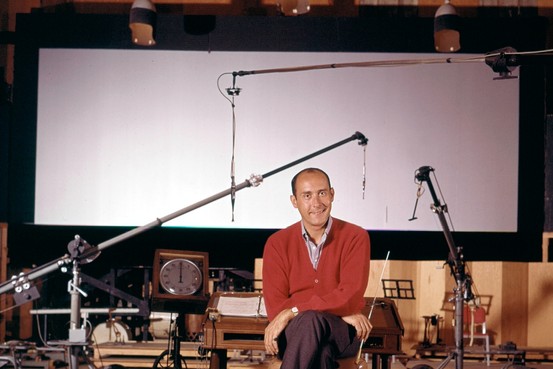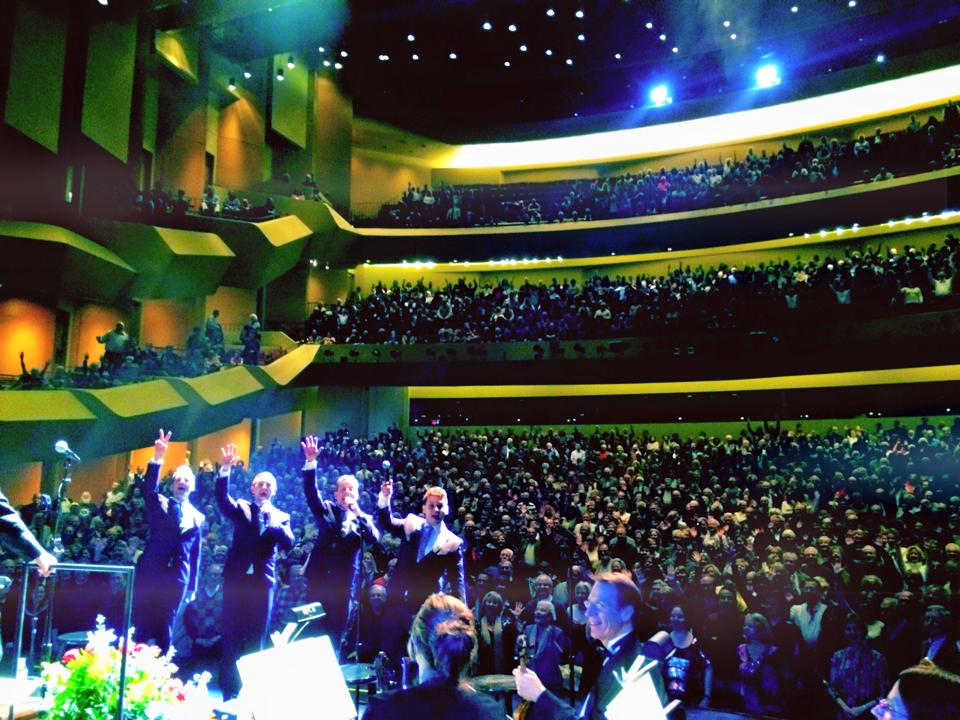Composer Henry Mancini
Hollywood Hits
Louisville Orchestra
Bob Bernhardt, conductor
Review by Annette Skaggs
Entire contents are copyright © 2019 by Annette Skaggs. All rights reserved.
What would movies be without the often-scintillating musical scores that accompany them? Even in the early days of cinema, piano, organ, or a small orchestra to provide another level of sensory delight to moviegoers accompanied silent films. To be honest I can think of many movies where the soundtrack is the most worthwhile thing.
Saturday such a full and vibrant Whitney Hall audience greeted evening’s program of Hollywood Hits ready to sit back and enjoy selections from such composers as Elmer Bernstein, Michael Giacchino, and Henry Mancini. and an up and comer by the name of John Williams (I kid, I kid).
Mr. Williams, who Mr. Bernhardt jokingly referred to as a Starving Artist, treated us to two compositions. The first piece was what is commonly referred to as the “Raiders March” from Raiders of the Lost Ark. This piece calls for striking strings and strong horns, but I didn’t get a lot of ferocity from the violins within the first measures of their entrance. A little prompt and you could see Indiana Jones running from the giant boulder. The other was “Superman March” from Superman (1978), a tip of the hat to the viola section for a beautifully played selection. Funny how music seeps into your brain and makes you think of things you hadn’t before. Although I have heard the Superman theme probably thousands of times, it occurred to me as I listened again the seeds of later Williams film scores that I could hear within it: Star Wars, E. T., perhaps a bit of Hook when Peter Pan and the gang flies to Neverland. How appropriate that Mr. Williams is considered the foremost composer for flight music.
What a nice segue to another selection of the evening, Michael Giacchino’s “Star Trek: Into Darkness Suite” from the movie of the same name. I am not a Trekkie by any stretch of the imagination, but I respect and am familiar with the franchise as I have several friends that live and breathe the Trek life. Color me surprised at how much I thoroughly enjoyed this piece. Using the very familiar original theme as its base, “Darkness Suite” built from that moving and sumptuous piece that can seem a bit rough around its edges, but delivers a full punch.
Everyone likes a sing-a-long, right? How about a whistle-along? The audience got to do just that during Kenneth Alford’s “Colonel Bogey March” from The Bridge Over the River Kwai. While the orchestra hit all of the right notes, especially in the winds section, I wonder if there was a whistler planted somewhere stage right of the hall, which was almost pitch perfect.
There were three sections of musical delight arranged by Jeff Tyzik that were set to three themes: “The Best of Bond”, “The Great Western Suite” and “The Big Movie Suite”. Included within those suites were themes from some of the greatest movies in their respective genre. Within “Best of Bond” we heard Dr. No and Live and Let Die, with the orchestra nicely emulating the electronic instruments that were used by Paul McCartney and Wings. While I didn’t recognize all of the music within the “Western Suite”, I did recognize The Magnificent Seven and How the West Was Won. Some of the titles featured in the “Big Movie Suite” were also unfamiliar to me, but I recognized Gone with the Wind and Dr. Zhivago, our Louisville Orchestra doing well to encapsulate the breadth and scope of those pieces.
Perhaps some of my favorites were from Henry Mancini. Mr. Bernhardt chose three of his best-known pieces: “Peter Gunn”, “Moon River” and “The Pink Panther”.
When Mr. Mancini was asked to write a theme for the television show Peter Gunn (1958), he wanted to incorporate a bit of the jazz and rock that was prevalent at the time. Mr. Bernhardt shared a bit of studio musician lore that when the musicians finished playing there was silence for a while and then an exclamation of “I can’t believe how good that is!” Excellent writing can sneak up on you like that. So can excellent playing.
“Moon River” made it into the canon of musical notations for a reason, it is a hauntingly, beautiful melody. While it has been covered by hundreds of artists, perhaps Andy Williams’ version was the most memorable. While we didn’t have a vocalist Saturday evening, I much preferred the orchestral version.
Was that Pink Panther diamond ever returned after it was stolen? Growing up I would watch both the cartoon and the late, great Peter Sellers in his role as Inspector Clouseau with childish glee. As an adult I re-watch those movies in a similar way. But other than the superb slapstick comedy perhaps the most memorable aspect of those movies is the striking and familiar theme with its super sexy sax solo. Unfortunately, where I was seated, I could not see who was behind that horn, but was that ever smooth!
I’d also like to recognize the percussionists and larger horn sections as they all had a larger than usual workout through the evening and they all did well.
Also included was Elmer Bernstein’s “To Kill a Mockingbird”, from the deep and meaningful score for the 1962 film, and Maestro Bernhardt took a moment to dedicate its performance to the memory of the late David Jones, who had passed earlier in the week. We have all benefited from his philanthropy and giving nature of this citizen of Louisville.
Bravi Tutti!
Hollywood Hits
September 21, 2019
Louisville Orchestra
Whitney Hall, Kentucky Center
501 West Main Street
Louisville, KY 40202
502-584-7777
Louisvilleorchestra.org
Annette Skaggs is heavily involved as an Arts Advocate here in Louisville. She is a freelance professional opera singer who has performed throughout Europe and in St. Louis, Cincinnati, Boulder, Little Rock, Peoria, Chicago, New York and of course Louisville. Aside from her singing career, she has been a production assistant for Kentucky Opera, New York City Opera, and Northwestern University. Her knowledge and expertise have developed over the course of 25+ years’ experience in the classical arts.





